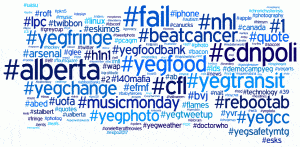Hashtags are spam that need to go away. According to reports that have hit the mainstream media lately, Facebook has just (finally) gotten #hashtags. Facebook tends to be a “late adopter” of a lot of technology and features, so you know that when Facebook “finally” gets a feature such as hashtags, the feature is on its way out. But I digress.

So, why are hashtags spam? Hashtags turn into legitimate Tweets and Posts on social media sites because the user decides which #hashtags to use in their post or tweet. When you insert a hashtag, you’re adding a keyword or keyword phrase in order to categorize it. While a very small percentage of hashtags are totally appropriate, we are now in a situation where hashtags are abused so much that they’ve become a form of spam. Take a look at the following recent screen capture for #paydayloan on Twitter. There are plenty of people who have tweeted on Twitter who are not using that hashtag for legitimate purposes.
I recall a having a conversation a while back with a very prominent representative from Google. You probably know the one. He told me Google’s stance on hashtags: “Hashtags are spam”. Plain and simple. (I regret that I am unable to find my actual notes from the date and time of when this occurred, but it makes sense to me, based on “search” and the whole history of how keywords are used on the web.)
The problem is that the end user, the person creating the content (or the tweet, the post, etc.) on the social network is deciding which #hashtag to use on their content. And when the end user decides what is an appropriate keyword (or hashtag) to use on their content, all heck breaks loose and it’s opened up for abuse.
Do you remember the meta keywords tag that was so prominently used by the search engines back in the 1990s? Well, I do, since I was actively practicing search engine optimization back then. I remember that the title tag was important, but also the meta keywords tag was important, as well. You could literally decide which keywords were appropriate for your web page, and put them in there. And the search engines would take those keywords into account when crawling and ranking your web site.
But, by 2001, the meta keywords tag became so abused that it wasn’t really that helpful anymore. And search engines got much more sophisticated. They didn’t need to use anything that allowed the web site owner to decide how to categorize their web page. The search engines could figure out what a web page was about, so there was no need for the meta keywords tag anymore. And, it got so abused that it’s now really a deprecated meta tag. I don’t recommend that anyone use that keyword tag on their web pages anymore. It’s just a form of spam if you do.
I spoke to a friend of mine, another SEO expert, Chris Silver Smith, about hashtags and how they relate to the meta keywords tag. Here is what he had to say:
Bill, I believe you’re right. However, that was because relatively few people had been using them, and of the usage, a large amount was a bit spammy. I think they could change perspective if the general populace used them more. I think usage is rising, so this could happen. Facebook’s adoption could help, or maybe not. Meanwhile, I use pretty sparingly.
Well, I’ve seen uses that I don’t consider spam — when groups want to associate Tweets with one another, when people are discussing events, when it makes sense for updates to be associated with a common thread. Those aren’t all spam – intentioned.
In fact, Meta Keywords were not all spam, in cases where people used them ethically and properly. It was promptly abused, so it was ruined by people associating pages with completely inappropriate keywords…
I agree with Mr. Silver Smith. There are situations where it’s very legitimate to use a hashtag. In fact, right now, as I look at Twitter, the #smx hashtag is trending. That’s why there are so many people at a search engine conference who are tweeting furiously about the conference, all adding the hashtag of #smx to their tweets on Twitter. But, that is a rare case. Technical professionals using a hashtag for a conference or even a Tweet Chat on Twitter is very helpful.
When hashtags like #smx show up in the Twitter Trending topics, it is legitimate–because it’s from a conference of search marketing professionals. And when hashtags show up many of them are legitimate, like the hashtags for #USOpen, as shown below:
But when you you get hashtags that are trending, or hashtags that are popular keywords, you tend to get all sorts of spam, like this:
The problem now is that hashtags are being abused. And they are being so abused now that hashtags are now spam.
So, consider the fact that hashtags are the “meta keywords tag” of the 2010s, and will soon become totally useless, because they’ve been abused so much. Furthermore, many people that I have spoken to recently just ignore hashtags anyway. They really don’t mean anything anymore. Perhaps that is exactly why Facebook has decided to finally adopt hashtags?


